#everything i read as a child and teenager was expressly something as different from my world as possible. bc i wanted to relate as something
Text
i dont know how else to put this but to approach books (or any media, really) solely for the sake of relatability is genuinely incredibly heartbreaking......to have such little (or such unwilling) imaginative scope that you cannot stretch yourself, even marginally, in a different direction to what you’ve known or are used to knowing when the very POINT of stories is to transport you somewhere else, into someone else, so you can do just that........when fran lebowiz said a book “is supposed to be a door!” and george saunders said good prose “is like empathy training wheels” they were right!!! they were so so so SO absolutely entirely right!!!!!
#thinking about that last post still and i'm having so many thoughts#that people have relatability as the sole criterion is astonishing to me#like how else are you going to develop variegated textures in your relationships w others?#not to be dramatic but it seems like a little death to me. truly.#everything i read as a child and teenager was expressly something as different from my world as possible. bc i wanted to relate as something#other than me#once again it is. heartbreaking#truly it is#p#book talks#idir lúibíní
13K notes
·
View notes
Text
Shoujo and the Bride of Christ (I)

I was fourteen years old, Shinji Ikari´s age, when A Bridge to Terabithia made its movie debut. Like his fated stay in Misato’s house, only in time have I come to realize the influence it has had on me. Leslie Burke, the imaginative and courageous adventurer played by AnnaSophia Robb, did not only unveil a new world (or many) for Josh Hutcherson´s character, but for me, too. Who would have known? The wonders they discovered, the things they built together, their common battle against evil and injustice, their shared experiences, and the way they got to know each other and count on each other made a deep impression on me. And I thought she was interesting, pretty, even beautiful. I´m sure many of you have a story like that. A classmate, a friend, a character, a book.
With my Hachiman antics and my teenage fears, I had been too defensive and self-conscious up to that point to think seriously about romance (even if, as with him, I felt its attraction). But it was from there, if ‘´m not wrong, that the thought of a man-woman alliance—deep, trustworthy,opened to God and to the adventure of life—began to seem like an attractive possibility. An ethic to fit that ideal was one of sincerity, friendship, selflessness, chivalry, self-sacrifice, prayer, loyalty, courage and honoring promises (that of the Code of Kushieda, romantic version). Much has happened since, but the essentials remain unchanged. I wouldn’t forget, or settle for less. Ever since, I have loved stories of hard-earned romance, of mutual discovery, of the fight for the good of the other and complementary communion, and even new life.
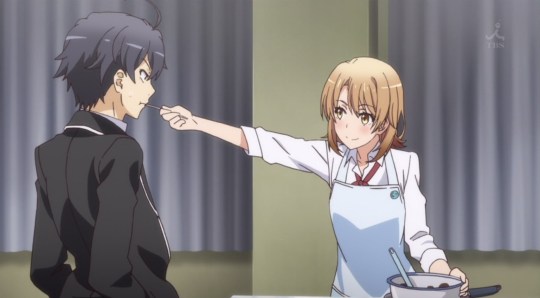
Anime, with its gift for depicting deeply personal worlds with colorful symbols, has some great stories of this kind. You have Toradora, Haruhi, OreGairu, Sakamichi no Apollon, Your Lie in April, Clannad, Ore Monogatari, EVA itself, or movies like Ghibli´s Whisper of the Heart. Many are told from the point of view of the guy, but some of the best are not: This is how I discovered shōjo or shoujo. Its best stories brought me a different, yet recognizable world, because discovering human love is, after all, a very human experience. It is also a powerful mystery, which according to the Bible, was expressly established by God himself. “For this reason a man will leave his father and mother and be united to his wife, and the two will become one flesh.” To which St. Paul comments: “This mystery is profound, but I am speaking about Christ and the Church.”
Wait, what?
Last year, during the Spanish quarantine, I had the idea of explaining the Eucharist and its role in my life using examples from shōnen anime. By symmetry, I was wondering if there was some other aspect I could explain with shoujo anime. It turns out that there is. After all, before discovering Terabithia, I had discovered Christ and the Church (according to the Catholic conception), and, as crazy as it sounds, I thought St. Paul’s comment, with its echo at the end of the Book of Revelation, did fit. I read Dante’s The Divine Comedy (this year is his seventh centenary) at 16, and that connection only grew. It still does. Ready for the ride?
Sawako Kuronuma´s Human-shaped Gate
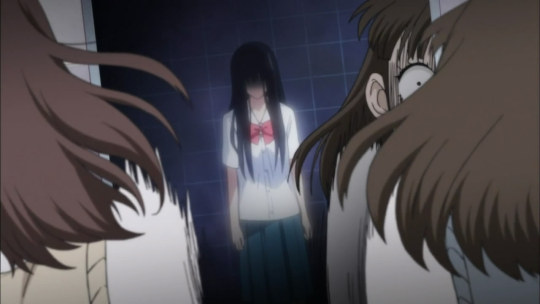
“But… you know that’s just biology, right? Chemical fireworks, so that the species can perpetuate.” I take issue with the word “just” here. God is the author of nature, which is thus full of depth, beauty, and meaning and providentially disposed towards our growth as creatures. There is chemistry, and there is more. While it is important to take everything into account and be careful when discerning our course of action, the faith in Christ is an incarnated faith. Our bodies, our natures, our stories are full of meaning, and we may come to discover it (and not just invent it), little by little. There is a deep wisdom in the created world, at every level, from the atoms to the stars.
In the Book of Genesis we are told that, when God created man and woman, Adam named the animals and witnessed a Creation in harmony. But not until meeting Eve did he discover a creature made of something deeply and intimately his, something he had been lacking without knowing it. She was just like him, and at the same time she was so different. For her, with her, he would go beyond what he knew, and they would be as one from there on. And their complementarity was to be the source of something new, of something great. Even more amazingly, she felt the same way. That was (and is) God’s design, which reflects His own powerful, generous love, “the fiercest blaze of all.” Something like that could only have been God´s idea, really.
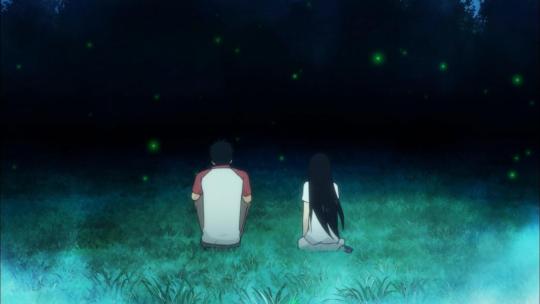
Kimi ni Todoke (From Me to You) tells a story that, despite its contemporary setting, feels very Edenic. We have commented on it here a couple of times. I’m not even the first to point the Biblical analogy. Sawako (which means “lively child”) Kuronuma, nicknamed “Sadako” because of her resemblance of the phantom girl of The Ring, is isolated. She has a gentle, bright interior world she cannot share. Her lack of social skills and her terrifying aura get in her way, no matter how hard she tries to get along. She is misinterpreted time and time again. But a certain guy named Kazehaya, cheerful, popular, and sporting, is not fooled by appearances. He calls her by her true name. He supports her, little by little. He guides her. And, starting from there, her world begins to transform.
The seasons change, their bond is tested, nature surrounds them and echoes what is in their hearts, and she gradually discovers many things she couldn’t even conceive of before. Friendships, joys, sorrows, a place in the world, and Kazehaya, too. There is a chance, now, that her feelings may come across. And Kazehaya is the first step, the destiny, and the gate.
So, what is the Church of Christ? First and foremost, it is a loving bond with Jesus Christ, a real, human and divine person with a physical body, and to His Father, of Whom He speaks which such passion, and the Holy Spirit. Someone who lives, who longs for us to know Him, to open new worlds to us, without whom we will always be incomplete. He is the light, we are vitrals: He will make us shine with our true shape, our true, unique colors. Sawako always shone, but never so much.
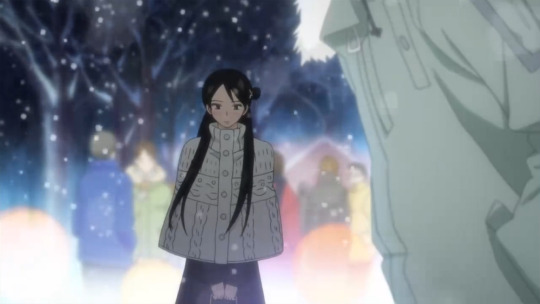
Like her, like the characters of the Bible and the Gospel, each of us is called, one at a time, visibly or invisibly, by his or her real name, not the one of the world of appearances, and it is the name of a child of God, and full of life. When we follow Christ, He makes us courageous. He makes us grow. He fights to get us to go forward. He makes us able to truly love, to bond with others. Jesus of Nazareth is the Word of God, the key, the truer, deeper, loving meaning of all that has been created, of every human being. And each one of us, personally but also in communion with others, is his Church, when chosen by Him, when united to Him, when walking to finally reach Him and letting Him finally reach each of us, through all History and Creation. And in being with Him, there is life, everlasting life.
But, even if it is still in us, we do not live in Eden. There was a fall. The world changed. And so…
Futaba Yoshioka and Her Seven Demons
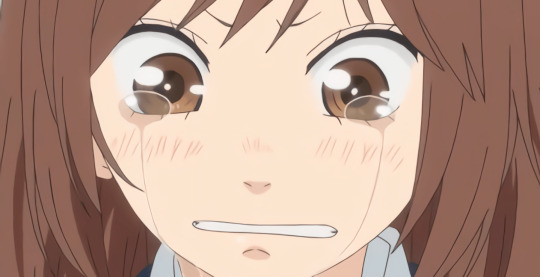
In a moment of cowardice, Futaba loudly denied her newly found love for her classmate Kou Mabuchi. Unexpectedly, he heard her. So it begins.
Ao Haru Ride (Blue Spring Ride) is similar to Kimi to Todoke in some aspects (and has an episode-by-episode analysis by Twwk here), but there is a key difference. Futaba’s misfortune was not brought about by her appearance, but due to her being inauthentic and cowardly out of fear of being alone, or rejected. Kou Mabuchi, returned after a few years of unexplained absence, knows Futaba from the old days. Superficial friendships, cowardly stances, artificial laughs, boyish behaviors planned so she won’t stand out, a deep solitude, a kind of slow self-destruction—he sees through it all. He knows that she has lost herself, that she is longing for something different. So he attacks with words, with acts that point beyond. It hurts, a lot. But something about him says that he is doing it in the name of something truer, that he could guide her there, and that he is no stranger to pain and sorrow…
…which, in my view, doesn’t excuse the disconcerting, nosy, and sometimes cruel behavior Kou often displays towards her (I don´t like this one as much as Kimi ni Todoke). But, to the allegory. After the book of Genesis there is the book of Exodus, the flight. Like Futaba, we are all lying, distorted, trapped from the inside, often unknowingly. As Sarah in the Book of Tobit, as Israel in Egypt or Babylon, as Mary Magdalene in the Gospel, we are oppressed by evils, personal, social or even the supernatural, that often control or manipulate us, that enslave us. The natural development of the deeply ingrained evil is suffering and self-destruction when its inner truth arises. And Christ is the one who knows us and will fight to free us, to open a path, and the Man of Sorrows, who not only bears unbearable suffering but knows our personal suffering, the suffering of each one of us.
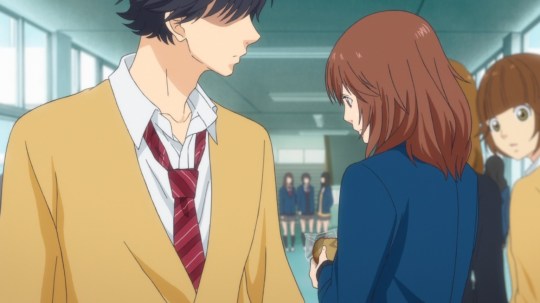
In a moment of cowardice, Peter loudly denied knowing Christ, who he had confessed to be the Son of God, who had chosen Him, whom he loved. And like Kou with Futaba, He heard Peter, too. But Peter repented, and Christ had a path for him, a path with others. Futaba, motivated by Kou’s words and deeds, abandons the world of lies and starting anew with a group of misfits, people who cannot advance, who perceive themselves or are perceived by others as failures or phonies. It becomes quite literal when they get lost in the forest during a competition. The Church is, likewise, a scattered group who flee from Christ´s cross, as He had prophesied, but is then brought together again. Founded upon Christ´s love, following His words of eternal life, we are still sinners, ambitious, clumsy, cowards. The old Israel thought that, by perfectly observing the Law, it could fulfill the alliance and bring God´s favor upon itself, but kept betraying Him, even if they sometimes managed to hide it behind a facade.
But Christ made clear that He came not for the healthy, but for the sick, the evil, the cowards, those traitors. Peter, the Apostles, and the disciples were chosen not because they had somehow merited it, but because they trusted Him and followed Him, even if stumbling along the way. He would made them able to triumph. Love is radical, and as we are transformed by it, love increasingly needs us to fight whatever denies it within us. It is by no means an easy battle, and Ao Haru Ride knows that. Christ is prophesied champion against the Serpent of Eden, Satan, the Adversary, the fallen angel who tempts us, and against the evil whose maximum he represents. He begins His mission by confronting him in the desert, and fights evil, forgiving sins and expelling demons, one after another, and finally prevailing over them by perfect obedience and love, onn the Cross and in the resurrection.
And His fight goes on. He wants us to have part in His death and His resurrection, from baptism to a death in Christ and beyond. He is the Savior, and the Church is his Noah’s Ark, His people of Israel escaping Egypt through the Red Sea, His plan of salvation for everyone who accepts His personal call and jumps inside to escape self-destruction and death together. He is the lover who needs the loved one to trust Him, and to fight, and will be there to help. Against the entire world, against death, against everything. The plan of salvation won’t work without that kind of love.

When they join the group, Kou lets Futaba do most of the teamwork. He… has his reasons. During His mission, Christ gave Peter and the rest of his disciples the power to expel demons, to forgive sins, to baptize, to teach, and sent them. Not because He, the Almighty, needed them, but to help them, to help human beings through the cooperation of human beings who became closer to God this way. He still does that now. He also gave them the treasures of His love, which they keep. His Sacraments, His miracles, His Gospel and His teachings, all signs and acts of His love, are preserved in the Church, a house build in rock against which the gates of Hell shall never prevail. He will be with us every day, until the end of the world, if there is the slightest bit of hope that we may accept His hand, acting, saving. Heaven and Earth will pass away, but His words will never pass away.
Christ has pleaded in prayer for Simon Peter, that messy, loud self-confessed sinner, that his faith should not fail, so when he has repented, he will strengthen his brothers, feed Christ’s sheep. Peter, who reacted with undue violence (Futaba may need to confront old friends in the name of justice, but it is her own cowardice what she is mainly fighting against) and then denied Christ, will be able to disavow the Sanhedrin and Caiphas, preside over the martyr Church, and die on a cross for Christ and others, to go where he doesn’t want to go right now, and teach others to do the same. All because Christ loves him, and he loves Christ, and that love is fighting and growing. And the messy, loud, cowardly Futaba will also be able to face her demons, and face challenges, darkness and suffering beyond everything she had imagined, to tell the truth, to save others.
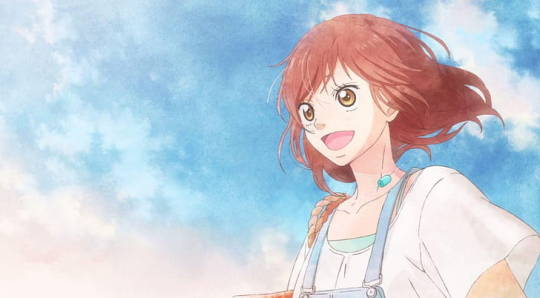
Do not be fooled by my criticisms: Futaba is a wonderful, relatable, inspiring character. She keeps the fight. Kou is very lucky. In this fallen world, every relationship, every bond, every friendship, every marriage, demands us to keep the fight. Human love, being made by God, reflects a ray of His own light, a ray that makes us hope and moves us to action. Likewise, the Church of Christ fights on this Earth, fulfilling the command of Christ to Peter and the Apostles, and those who came after them, teaching the Gospel and giving the Eucharist, bringing Christ´s love to our hearts. We, the group of misfits and sinners, keep assisting each other on the way, doing better or doing worse, knowing that He also works outside her visible frontiers, fighting to reach all human hearts. This is the Militant Church, which Christ will never abandon, in perpetual combat against her own evil, my own evil, and against the powers that enslave us, that enslave me, armed with the most powerful force there is—Christ´s love, Christ´s truth, Christ´s own hope. That is her source, her life and her destiny. And so she fights. And so I fight.
But what’s on the other side of the forest? What has it to do with the Divine Comedy? What is Tohru Honda doing at the top? Those are all questions for the next time. So, for now, take care, and Happy Easter!
=====
Kimi ni Todoke and Ao Haru Ride can be streamed in Crunchyroll.
#Anime#Christianity#Kimi ni Todoke#Ao Haru Ride#Kimi ni Todoke: From Me to You#Blue Spring Ride#Shoujo#Articles#Author: Gaheret
3 notes
·
View notes
Text
Brick Club 1.5.9 “Madame Victurnien’s Victory”
This is simply a translation thing, since Hapgood translates it as “success,” but I think the title containing the word “victory” is interesting because it really implies that Mme Victurnien got something out of what she did to Fantine, that she “won” against Fantine. What she got was a sense of sated curiosity, a curiosity whose satisfaction ruined another human being.
Hugo starts the chapter off saying that Victurnien’s actions did some good, only he then reveals that Valjean never entered the workshop and explains that the overseer was only charitable from a certain angle. How is this good? Valjean, who is described as “even the best men,” is trusting that this woman’s morals are in line with his own simply from word of mouth, rather than checking in. He never sets foot in the workshop and has given her full power. Again, no wonder people are turning to sex work as a side hustle. How many other women has this happened to? And the overseer thinks she’s doing some good!
The overseer is “full of the charity that consists of giving, though to some extent lacking in the charity that consists of understanding and pardoning.” But isn’t this the entirety of Madeleine’s system and philosophy? He helps people by giving them money. He tosses money at them but doesn’t want to see the aftermath and doesn’t want to be the one doing the face-to-face benevolence. He can’t handle being responsible for problems that a little bit of money can’t fix. The only time he seems to do things face-to-face with others is when they specifically come to him (like as a judge or a settler of conflict); he doesn’t ever go to them. The overseer is full of the “charity that consists of giving” because that’s what Valjean’s rules teach. They don’t have space for sitting down and trying to understand. The morality of these rules don’t allow for that. If the only rule to work in this factory is to be an “honest woman,” how do you confront a structure that creates this desire to seek out and banish immorality rather than examine itself and its components for prejudices and then find ways to assist these women who clearly have little to no support?
I’m wondering too if Valjean’s rule fostered this rumor mill. Having a strict code of morality is a great way to foster ill will if people are more nosey or malicious or less mutual aid-minded than others. Especially in a factory where people are paid by their output. If someone is better than you at the job you share, it makes sense to start a rumor about them to get them kicked out so you become the one who gets their pay. This isn’t quite what happens to Fantine, but I wouldn’t be surprised if it happened to other women. In terms of Fantine and Victurnien, again this strict moral code is a breeding ground for the gossips and rubberneckers that Hugo described last chapter.
Valjean’s system just frustrates me so much. Again, putting so much power in the hands of a person without checking if they’re trustworthy or not, without having a system of “is this person treating my workers right” is just so....careless? That’s not exactly the word I’m looking for but it’s just like Valjean puts this morally strict system in place and expects it to just solve all problems. He’s busy helping other people solve conflicts and things and doesn’t seem to realize that these rules he’s put in place are going to create problems as well. Not to mention that everyone’s ideas of ethics or morals are going to be different. Would Valjean have condemned Fantine if he’d heard her story? We don’t know. But this overseer’s idea of the right thing to do and the right action to take may well be very different from Valjean’s intention upon setting these rules. Which creates circumstances like this.
Am I reading something wrong, or did the overseer not take record that she had given Fantine the 50 francs? I read “of which she rendered no account” as the overseer not bothering to write down the fact that she gave Fantine 50 francs from the money for donation and aid to workers. Is that right? If this is true than it would also give even more reason for Valjean to have no idea: if he doesn’t set foot in the women’s workshop but does look at the expenses, this wouldn’t have shown up either.
The landlord telling Fantine “you’re young and pretty” is a foreshadowing of the next couple chapters, but I also think it’s interesting that the landlord seems to insinuate that she could be a sex worker. Again, this is a garrisoned town. Sex work must be an open secret here, something Valjean maybe refuses to see.
I love Marguerite so much. I think this might be the first and only time Fantine has a friend who actually cares about her. It makes sense that Fantine would have a much older woman as her friend. Hugo says she’s wise, and I think that her sort of quiet wisdom would resonate more with someone much older than with grisettes her own age. Plus an older person might be much more patient with her when teaching her these new ways of living and maybe guiding her through actually noticing these social cues for the first time. Marguerite is kind of like Fantine’s Myriel; she is a pious and religious old woman who takes Fantine under her wing to learn how to live and survive. Only, rather than taking Fantine’s soul for god or anything, she’s giving Fantine a friend, which seems to be something she’s never had before. This is the first time we see Fantine talking to someone else as an equal.
Hugo mentions that Marguerite taught Fantine how to give up an expensive bird. It’s odd to me that this bird is never mentioned. When did she get a bird? If it was with her in Paris why did she not sell it to move to M-sur-M? However, I 100% understand owning a pet even when you barely make any money to buy yourself food. Pets make you feel better about yourself because you’re caring for and getting love from another creature. Fantine has now had to give up Cosette and her bird, both two small things she’s able to give her love to.
Fantine’s backstory is so odd. How did she not know how to “live poor” already? She was an orphan, and as we see later, orphans in the Brick (taken in or otherwise) are generally treated poorly and are exceedingly impoverished. How had she never lived in enough poverty to learn how to reuse things and give things up? This is clearly the most poor she’s ever been, and even Feuilly makes a good deal more than her later on, but it seems strange that even as a young child or teenager she didn’t live in similar poverty, if she was an orphan with no other monetary support besides her own work.
Fantine mentions that she only sleeps five hours a night. We don’t get a lot of mention of characters sleeping. A little here and there, but the Thenardiers don’t seem to sleep, like, at all when they’re in Paris. This is a kind of subtle aspect of it, but being this poor is crazy hard to get out of because it requires so much work. Fantine makes like 9 sous (I think?) making shirts. She’s taking up just under 19 hours of her day sewing, which I would imagine might produce maybe 3 shirts? Depending on whether she’s doing the entire thing from scratch or using patterns or taking someone else’s already fitted and cut out pieces and stitching them together. Either way, sewing takes quite a while, and if she’s taking 19 hours of her day doing that, she has no time to do things like look for a better job. And she’s also still in debt, so she can’t move somewhere with more opportunities, either. The Thenardiers barely sleep because they’re constantly trying to come up with ways to get money as well. Marius seems to barely sleep; he spends his time translating. Sleep is so rare in this book, it’s kind of a surprise when it’s mentioned.
“When one is sad, one eats less. Sufferings, troubles, a little bread on the one hand, a little anxiety on the other--all that will keep me alive.” More of Hugo’s weird thing about suffering. Even more than an ableism kink, he’s got this whole suffering = good thing going on. This is from 3.5.1, about Marius, but I think it summarizes Hugo’s opinion well: “Firm and rare natures are thus created; misery, almost always a step-mother, is sometimes a mother; destitution gives birth to might of soul and spirit; distress is the nurse of pride; unhappiness is a good milk for the magnanimous.” (Hapgood translation as I’m too lazy to transcribe from FMA.) Reaction to suffering is Hugo’s gauge for a character’s goodness.
Also, this line about bread reminds me of Eponine’s line about not eating for three days, only Eponine admits to the misery of not eating, while Fantine tries to keep things light and optimistic. Again, we have Fantine seeing things through a sort of rose-colored lens. This time I don’t think it helps much, but it’s also not concealing danger from her either. It’s just that Eponine has lived so long in poverty that hunger is just an aspect of her life, and misery is something she seems to have simply accepted, while this is still vaguely new to Fantine and she’s trying to figure out how to deal with it.
“In this distress, to have had her little daughter with her would have been a strange happiness.” Mostly I just want to hang on to this quote because it parallels the later line talking about Baron Pontmercy wishing to have young Marius with him. I made a post before about the parallels between Fantine and Pontmercy, and somehow I didn’t catch this one, but here it is.
Everything in this book is about money, about how to pay. Everything in life is about money. It puts Valjean in an expressly unique position as someone who has a frankly ridiculous amount of money compared to pretty much every other character. But everyone except Valjean and Cosette are so highly aware of money, of how much everything costs, and what it takes to pay for something. And really the thing about poverty is that “cost” isn’t just francs, it’s also time and labor and emotion. If Fantine had just the tiniest bit more money, she could send for Cosette, but would Cosette then end up like the child of Valjean’s sister, sitting out in the cold in the early morning after Fantine went to work but before the schools had opened? Sewing shirts takes time; that’s either less time to be with Cosette and nurture Cosette or less time making shirts which is less money. Making enough money to live means sacrificing so much.
Only now does Fantine seem to be aware of social cues, which now have turned into paranoia (though she’s probably at least a little right). Since the beginning, she hasn’t noticed when people are laughing at her or whispering about her or making fun of her to her face. Even when Tholomyes left, I doubt she noticed because all of the grisettes were abandoned at the same time; I don’t think she would have realized that for everyone else it was a little bit different. But now all those whispers and mocking and social cues have been thrown in her face, and now she’s seeing them everywhere. It sounds like paranoia, but I think she’s right, and Hugo basically says so about a sentence later.
“She came and went, head high and with a bitter smile, and felt that she was becoming shameless.” This is another reason why I Dreamed A Dream in English frustrates me so much. The French version at least touches on Fantine’s anger, on the ways she has begun to harden. The English version really does not do that at all. It is interesting that she longs for the anonymity of Paris, and in the end seems to decide to treat M-sur-M as though it was Paris, and go out brazenly anyway.
Mme Victurnien and Tholomyes are at opposite ends of the self-centered individual. Tholomyes fucked Fantine over but didn’t care or think much of it, because once he’d satisfied the amusement he got out of his affair with Fantine, he simply dropped her and probably never thought of her or Cosette ever again. Victurnien, on the other hand, turns Fantine into a weird sort of obsession. Instead of not caring about ruining Fantine’s life, that becomes a kind of pleasure for her. A “dark happiness,” as Hugo calls it. It’s a sort of sadistic schadenfreude. Tholomyes didn’t spend anything to abandon Fantine, he simply left to go back to the country. Victurnien spent money to destroy Fantine’s life. Both are so terrible because one is so deliberately careless and the other is so heartlessly deliberate.
A last thought which is just kind of a throwaway thing, but since gaining the “Fantine as autistic” headcanon from whoever it was that came up with it, I’ve been imagining Fantine’s love of brushing and braiding her hair as a form of self-soothing. I haven’t had long hair in over 15 years but I remember when I did, brushing it or having someone else brush it always felt really nice. Fantine’s hair is so beautiful (later on Hugo says it falls to her knees which is !!!!) and I wonder if part of that is because of how often she uses brushing it to self-sooth when things are terrible.
8 notes
·
View notes